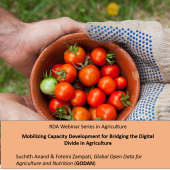Information and Communication Technologies (ICT) are being used across the world to generate efficiency gains for farmers. This has led to an information and data explosion with an associated boom in new applications, tools, actors, business models, and entire industries. Agri-food systems are being transformed.
Beyond the technological developments, data for and from farmers has become a growth area, driving expectations and investments in big data, blockchain technology, precision agriculture, farmer profiling and e-extension. Investing in data-driven agriculture is expected to increase agricultural production and productivity, help adapt to or mitigate the effects of climate change, bring about more economic and efficient use of natural resources, reduce risk and improve resilience in farming, and make agri-food market chains much more efficient. Ultimately, it will contribute to worldwide food and nutrition security.
Smallholders in particular have much to gain from data – small improvements in their operations are likely to provide larger gains at household level, proportionally, and, if the improvements are widely adopted, the whole agricultural sector in many countries that depend on smallholder agri-food systems can be transformed.
However, for smallholders to benefit from data-driven agriculture, tools and applications need to be designed for their specific situations and capacities; they – and the organizations that support them – need to grow their capacities to become smart data users and managers; measures are needed to ensure that farmer-generated data is not exploited or misused; and smallholders, usually the least powerful parts of a value chain, must grasp every opportunity to be included in the collective data flows within agri-food systems.
Recognizing the huge opportunities of data-driven agriculture and the gaps that currently prevent it from benefiting the world’s poor, GFAR, GODAN and CTA mobilized a group of experts to discuss the issues in a white paper on Digital and Data-Driven Agriculture: Harnessing the Power of Data for Smallholders.
The paper gives an overview of the huge opportunities and the main challenges of data-driven agriculture for smallholder farmers, illustrates some data and agri-food system drivers that can help make data-driven agriculture more smallholder-friendly and proposes ways to foster a data ecosystem that truly enables farmers to fully harness the power of data.
The paper is a contribution towards the Collective Action on Farmers’ Data Rights being developed through GFAR with GODAN and CTA.
The next steps in this Collective Action will be an online consultation to take place on 4-8 June 2018 and an expert consultation in July, both on the topic of “Ethical, legal and policy aspects of open data affecting farmers”.
Citation:
Maru A, Berne D, De Beer J et al. Digital and Data-Driven Agriculture: Harnessing the Power of Data for Smallholders [version 1; not peer reviewed]. F1000Research 2018, 7:525 (http://dx.doi.org/10.7490/f1000research.1115402.1)
Blog post by Peter Ballantyne, Ajit Maru and Valeria Pesce






